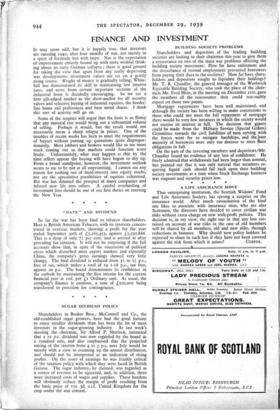BUILDING SOCIETY PROBLEMS
Shareholders and depositors of the leading building societies are looking to their chairmen this year to give them a reassurance on two of the main war problems affecting the building society movement: How far have enlistment and the disturbance of normal employment prevented borrowers from paying their dues to the societies? How far have share- holders and depositors sought to liquidate their holdings? Mr. T. R. Chandler, the general manager of the Woolwich Equitable Building iociety, who took the place of the chair- man, Mr. Fred Hoar, at the meeting on December 21st, gave the members all the reassurance they could reasonably expect on those two points. Mortgage repayments have been well maintained, and although the society has been willing to make concessions to those who could not meet the full repayment of mortgage there would be very few instances in which the society would not receive its interest in full. The decision that ts could be made from the Military Service (Special Grants) Comniittee towards the civil liabilities of men serving with the forces went far to mitigate hardships, and the vast majority of borrowers were only too acixious to meet fheir obligations in full. On the part of the investing members and depositors,sMr. Chandler found no evidence of any loss of confidence. He freely admitted that withdrawals had been larger than normal, but pointed out that it was only natural that members re- quiring liquid cash should fall back upon their building society investments at a time when Stock Exchange business was stagnant and security prices low. * *






























 Previous page
Previous page